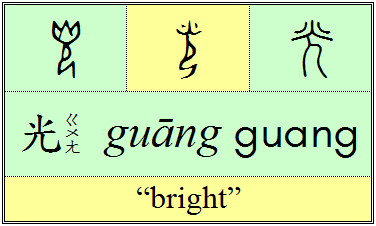
To ask people to let you go by, nobody says 借光 jièguāng / jiehguang anymore. 借過 jièguò / jiehguoh is now the correct expression, at least in Taiwan.
However, because I appreciate the respectful attitude and poetic sound of 借光, I occasionally use the old-fashioned phrase 借光, which literally means “[may I] borrow [your] brightness (sunshine)?”
Actually, the four-character phrase 不好意思 Bù hǎo yìsi / buh hao yih.sy "[literally] I am embarrassed [to be doing this]" is even more common. Gently make your way through a crowd while repeating this phrase: nobody will object or take special notice (as long as you pronounce it in a recognizable manner, including tones).
The etymology of 光 guāng / guang
In the Bronze Age writing called oracle script 甲骨文 jiǎgǔwén / jeaguuwen (also called “oracle bone inscriptions”), 光 appears as a semantic compound, a stylized drawing of a fire on top of a sitting human, presumably a person basking in the light and warmth of a small fire.
Note that early Chinese writing was not standardized, so this is only one of many possible ways to write 光. Wiktionary provides many more images and notes: https://en.wiktionary.org/wiki/%E5%85%89

The bronze script (金文 jīn wén / jin wen) form is similar to oracle script. You can still make out the sitting person (modern forms: TC 兒, SC 儿), but the flames have become unrecognizable abstractions. After the seal script reform carried out in the Qin Dynasty (秦朝 Qíncháo / Chynchaur), the character becomes more artistic but wholly unrecognizable to modern eyes.
In modern Chinese characters 現代漢字 (xiàndài hànzì / shiannday hanntzyh), the fire has been reduced to a straight line with a single dot on either side, and the sitting person has become two curved lines.
Stroke order courtesy of Wikimedia Commons (CC--BY): 
Why this post uses the #steemstem tag
Self Introduction: Enthusiastic INTP Polyglot
https://steemit.com/introduceyourself/@wentong-syhhae/enthusiastic-intp-polyglot
I missed the voting window for your post. I'm going to make it a point to check steem more frequently.
The four character phrase you mention above, 不好意思, I've always viewed this as appropriate for the situation you mention, but also as a phrase that means the speaker is acknowledging that it's a potentially embarrassing situation, except the speaker doesn't necessarily feel any fault, guilt, or embarrassment for whatever is happening.
Am I completely off with this usage?